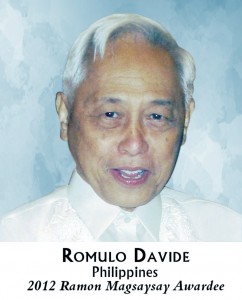UPLB scientist like a ‘movie star’ to farmers
SAN PEDRO, Laguna—University of the Philippines Los Baños (UPLB) professor emeritus Romulo Davide, 78, never fails to amaze people with his wit and passion to help poor farmers.
To his staff at the Farmer Scientists Training Program (FSTP), an extension program of the UPLB College of Agriculture that he has been heading since 2004, Davide is the type of boss “who really gets out of his office to give farmer training in the countryside.”
“Given his age, you’d see him get out of the car to push (the vehicle) when it breaks down. He even beats us when it comes to long hours of walk in the countryside,” said Guilly Valencia, a university researcher and FSTP staff member.
Davide, in fact, is the “low key” version of his more famous younger brother, retired Supreme Court Chief Justice Hilario Davide Jr., 76.
Professor Davide’s being “low profile” and approachable is also the reason farmers congregate around him whenever he is in the field, according to Valencia.
“He is like a movie star to them,” she said.
The FSTP is Davide’s brainchild to teach poor farmers low-cost and organic corn-farming techniques.
In 2008, then President Gloria Macapagal-Arroyo issued an executive order making FSTP a national government program under the Agricultural Training Institute of the Department of Agriculture.
Davide’s wife, Clara, 77, on July 25 said she was still trying to get hold of her husband by phone after a friend told her that Davide was among the recipients of the Ramon Magsaysay Award.
“Praise God, his hard work is recognized,” Clara said when contacted by phone.
Clara said it was her husband’s advocacy “to free the farmers from the bondage of poverty.”
“He wanted to teach the farmers who did not have access to technology in the universities,” she said.
Clara, a retired UPLB professor who specialized on dairy and food technology, said she saw how corn production of four tons per hectare in the provinces increased to five tons per hectare after FSTP.
“(Professor Davide) deserves the award. Even after he retired (as a professor) he continued working hard (with FSTP). It is also an honor to the UPLB,” added UPLB chancellor Rex Cruz.
In a phone interview Monday, Davide said the recognition gave him “mixed feelings of joy and accomplishment but (meant) more work to be done.”
He said the “challenge” continues to “bring the technology that we have to the farmers.”
Davide was born to a poor family in the remote village of Colawin in Argao, Cebu. As a boy, he and his brother, the former Chief Justice, grew up “tending the carabaos.”
“Our father said it was not the land that is barren, but the heads, so he sent me to Los Baños to study,” Davide said.
Davide took up agriculture majoring in plant pathology in UPLB. He earned his master’s degree in plant pathology at Oklahoma State University and his doctorate in nematology at North Carolina State University.
Davide said FSTP was being practiced in various sites all over the country, with more than 3,000 farmers trained under FSTP.
Even so, he said he did not consider retiring from helping poor farmers uplift their lives.
